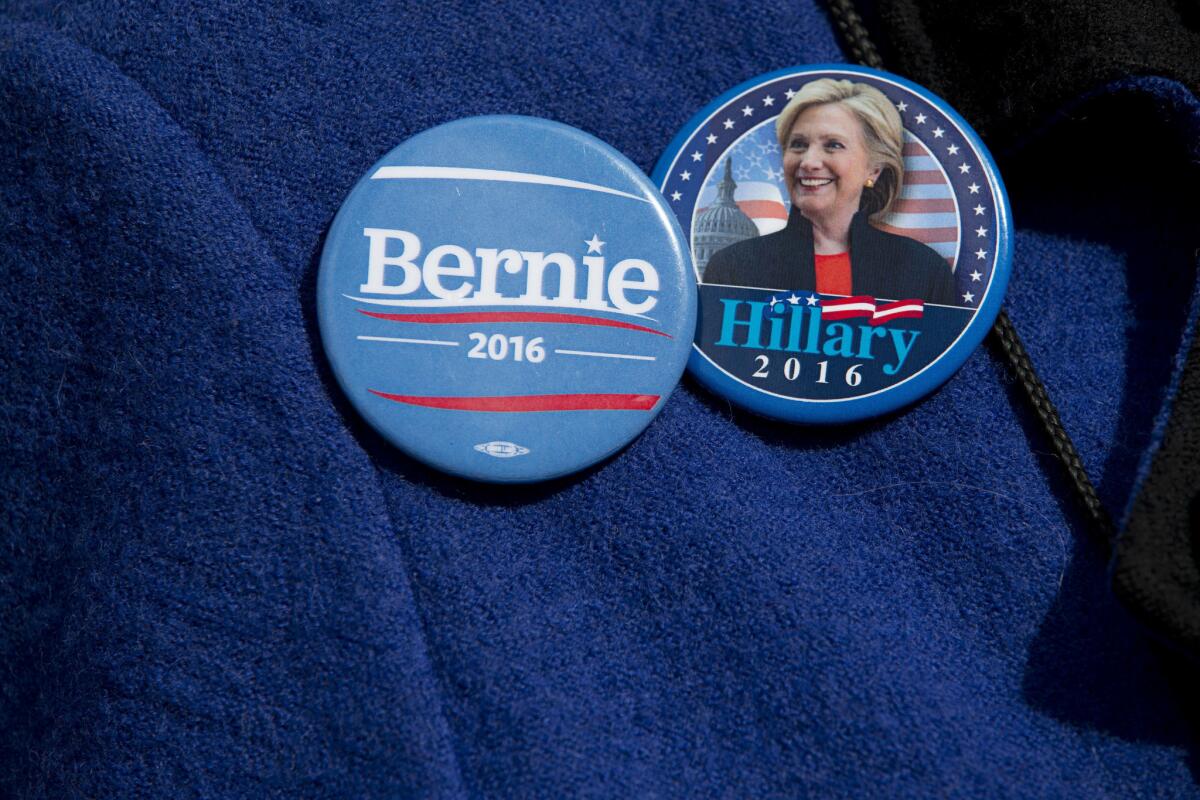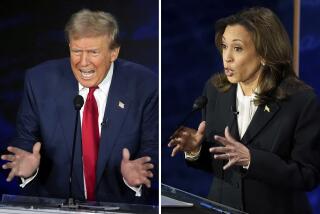Here are the questions Hillary Clinton and Bernie Sanders really need to be answering

A demonstrator wears both Bernie Sanders and Hillary Clinton buttons during a rally to condemn Republican presidential candidate Donald Trump’s remarks about women and abortion on March 31 in New York.
- Share via
Since Hillary Clinton and Bernie Sanders last debated, we’ve seen a terrorist attack in Brussels, more fighting in Syria and Iraq, a huge leak of offshore financial records from Panama — and new forms of chaos in the Republican Party.
So what have the Democrats been arguing about all this time? Who’s qualified to be president and who’s not; who’s being truthful, and who’s not; who knows how to ride the New York subway, and who doesn’t.
To help nudge them in a more substantive direction, I thought I’d offer up a half-dozen questions for Thursday’s debate. Moderators may copy them wholesale for the low price of zero dollars.
Financial regulation
Both Sanders and Clinton have called for tougher rules on Wall Street.
Sanders has made breaking up the nation’s biggest banks a keystone of his campaign, and he’s called for reinstating the 1933 Glass-Steagall law, which separated traditional banking from investment banking.
Clinton has called for stronger regulations aimed at the “nonbanks” that played a central role in the crash of 2008. She has said federal regulators already have the power to break up big banks, but she hasn’t demanded that they do so.
Beyond that, they’ve mostly talked past each other, each asserting that his or her proposal is tougher.
Question: What’s wrong with your opponent’s plan? Why shouldn’t we take both measures?
Financial transfer tax
Sanders has called for a tax on financial trading as a way to raise federal revenue — and to shift some of the tax burden from workers to investors. Clinton has rejected that idea; she’s called for a much narrower tax only on computer-driven “high-frequency trading.”
Progressive economists like Sanders’ idea better. Wall Street hates them both. Let’s hear a debate.
Panama Papers
The leak of the Panama Papers revealed how wealthy people around the world use shell companies to hide their assets overseas.
They also shed light on an unexpected fact: The United States is a haven for shell companies too, because secrecy laws in Delaware, Nevada and other states make it possible to conceal the ownership of corporations.
Question: Is there anything the next president should do to fix this problem? Is there anything more the federal government can do to stop U.S. corporations and individuals from avoiding taxes by stashing money abroad?
Islamic State
Military experts say the only way to defeat Islamic State, the terrorist organization based in Syria, is to seize its capital, Raqqa. But that will require a ground force; airstrikes aren’t enough.
Every presidential candidate, in both major parties, has said that ground force should be Arab, not American. So far, though, that Arab force doesn’t exist. Saudi Arabia and other Arab countries have said they are willing to help, but they want the United States to participate, too.
Question: Should the United States lead a ground force — including U.S. troops — to take Raqqa?
Nation-building
For more than 20 years, one of the main goals of U.S. foreign policy has been to promote democracy and human rights in other countries, from Afghanistan to Libya and beyond.
“The main focus of American foreign policy shifted from war to governance, from what other governments did beyond their borders to what they did and how they were organized within them,” foreign policy scholar Michael Mandelbaum writes in his new book, “Mission Failure.”
The underlying theory was that democracies would be less likely to threaten their neighbors or turn into breeding grounds for terrorism.
But U.S. efforts to transform political systems in those countries didn’t succeed. Failed states, beginning with Syria and Libya, still provide bases for terrorism.
Question: Should the United States return to the Cold War approach of supporting autocratic regimes — in Egypt, for example — in search of more stability?
No matter who the next president turns out to be, he or she is almost certain to face a House of Representatives (and perhaps a Senate) controlled by conservative Republicans.
Dealing with Congress
No matter who the next president turns out to be, he or she is almost certain to face a House of Representatives (and perhaps a Senate) controlled by conservative Republicans.
For much of his first five years in office, President Obama tried, off and on, to woo moderate Republicans into negotiations and compromise. Most of the time, he failed.
Question: How do you propose to avoid continued gridlock and dysfunction? Or will you aim for confrontation, and organize your presidency around the goal of capturing both houses of Congress in 2018?
Bonus question: What are the biggest mistakes Obama has made, and what have you learned from them?
Those are my top questions. What are yours? Send them to the e-mail address below, and we’ll post them in time for the debate panelists at CNN to see before the candidates go on the air.
Twitter: @doylemcmanus
Follow the Opinion section on Twitter @latimesopinion and Facebook
More to Read
A cure for the common opinion
Get thought-provoking perspectives with our weekly newsletter.
You may occasionally receive promotional content from the Los Angeles Times.







